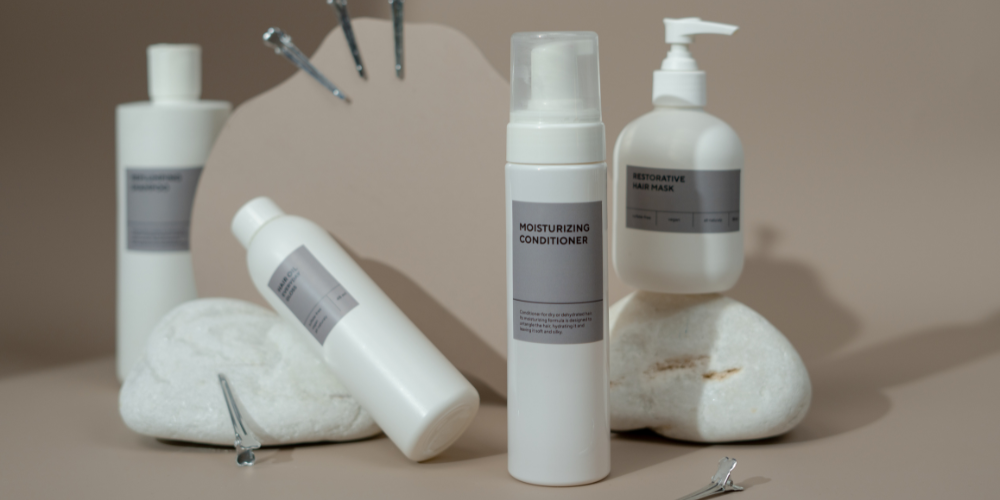A recent Harvard article, "Synthetic braiding hair used by Black women contains dangerous chemicals", shook the Black hair community. The study revealed that some popular synthetic braiding hair brands contain carcinogens, lead, benzene and volatile organic compounds (VOCs) — chemicals linked with cancers like myeloid leukemia and others- posing serious health risks.
For those of us who wear braids, locs, or twists, this news hit home. It highlighted the vulnerability Black women face in the beauty industry and got us thinking: If dangerous chemicals can hide in synthetic hair, what about the hair products like shampoos, conditioners, gels, and oils that we trust daily?
This concern leads us to another hidden threat: microplastics.
What Are Microplastics?
Microplastics are minuscule plastic particles (smaller than 5mm) that are often added to hair and beauty products to create a smooth texture or provide a glossy shine. While they might enhance product performance, they’re a serious environmental threat. Microplastics are non-biodegradable, meaning they build up in our oceans and ecosystems, harming marine life and potentially re-entering our food chain.
Why Are Microplastics a Concern for Black Hair Care?
For many Black women and men, hair care is more than just a routine—it's a deeply personal ritual that often involves layers of products to achieve desired results. From scalp oils to styling gels, Black hair care often requires added moisture, hold, and protection, making us even more reliant on products that may contain microplastics or harmful chemicals. The more products we use, the greater our exposure.
While research is still emerging, microplastics present several potential risks:
- Scalp Health Risks: Microplastics can accumulate on the scalp, potentially causing irritation or disrupting the scalp’s natural balance.
- Environmental Harm: When we rinse these products out, microplastics enter our waterways, harming marine life and the environment.
- Health Concerns: There are growing concerns that certain microplastics may carry toxins that could penetrate the skin.
So now the question is, 'How to Spot Microplastics in Your Hair Products?'
As aforementioned, microplastics are minuscule; therefore don’t exactly announce themselves on ingredient lists of hair care products. Instead, they are found in various forms, including:
- Solid Microbeads: Historically used as exfoliants in scrubs, though regulations are tightening in some regions.
- Liquid Polymers: These synthetic polymers are used to coat the hair, providing slip, detangling properties, hold, and shine. Common examples include acrylates copolymer, carbomer, dimethicone, Nylon-12, and various forms of polyethylene (PE), polypropylene (PP), and Polymethyl Methacrylate (PMMA).
- Film Formers: These polymers create a film on the hair, helping with styling and hold.
If you spot these on your hair product labels, it might be time to consider cleaner alternatives.

In this case, going forward, all you need to do to protect your hair and reduce microplastic exposure is;
✔️ Read Ingredient Lists: Avoid products containing ingredients like polyethylene, polypropylene, and acrylates copolymer.
✔️ Choose Certified "Microplastic-Free" Brands: Look for certifications like "Zero Plastic Inside" or eco-conscious labels.
✔️ Opt for Natural and Organic Products: Many natural brands rely on plant-derived ingredients instead of synthetic polymers.
✔️ Embrace Solid Hair Care Products: Shampoo and conditioner bars are often free from plastic-based ingredients and packaged with minimal waste.
✔️ Use Plant-Based Alternatives: Instead of dimethicone or carbomer, look for ingredients like xanthan gum, aloe vera, or flaxseed gel for hold and hydration.
Healthier Hair Products Without Microplastics
The good news? There are plenty of safer, eco-conscious brands offering products that nurture your hair without compromising your health or the planet. Here are a few to consider:
★ Ecoslay — A beloved Black-owned brand that blends sustainability with performance, offering hand-crafted, small-batch hair products made with clean, kitchen-grade ingredients. From their Flaxseed Gel to Banana Cream Deep Conditioner, Ecoslay proves that eco-conscious formulations can still deliver major curl definition and hydration.
★ The Afro Hair & Skin Co.— This award-winning UK-based brand crafts natural and organic hair and skincare products specifically for Afro-textured hair and melanin-rich skin. With a strong commitment to sustainability and ethical sourcing, their nutrient-rich formulas are handmade in small batches, ensuring purity, effectiveness, and environmental responsibility.
★ Flora & Curl — Known for their plant-based formulas designed specifically for curls, coils, and kinks. Their products are free from sulfates, silicones, and harmful chemicals.
★ Briogeo — A clean, sustainable haircare brand offering solutions for dry scalp, damage repair, and hair hydration without harsh ingredients.
★ Oyin Handmade — This Black-owned brand creates moisture-rich products for textured hair with simple, natural ingredients you can trust.
★ Alikay Naturals — Known for natural, moisturising formulas without harmful chemicals.
And better yet, #TTATTribe? We were thrilled to hear directly from Alikay Naturals following the release of this blog! In their own words:
“Want hair that thrives, naturally? Alikay Naturals is passionate about harnessing powerful botanicals, responsibly sourced, to craft natural hair care and sustainable skincare that deliver real results. Say goodbye to harsh chemicals and hello to a sustainable routine that feels as good as it looks. Choosing safer, more natural haircare shouldn't be a chore – it should be a delightful part of everyone's day.”
Their commitment to transparency, sustainability, and results-driven haircare makes them a standout in the clean beauty space — and a true ally in our mission to protect and empower Black hair, naturally.
DIY Hair Care for a Healthier Alternative
For those seeking the ultimate control over what goes in their hair, DIY treatments using natural ingredients are an excellent alternative. Here are two easy, sustainable recipes to try:
🌿 Moisturising Avocado Hair Mask: Mix 1 ripe avocado with 2 tablespoons of olive oil and 1 tablespoon of honey. Apply to damp hair, cover with a TTAT Shower Cap to lock in moisture, and leave for 30 minutes before rinsing.
🧀 Strengthening Banana Hair Mask: Blend 1 banana with 1 tablespoon of coconut oil and 1 tablespoon of aloe vera gel. Apply to your hair, wear a TTAT Shower Cap to allow the nutrients to absorb, and rinse after 20 minutes.

Our Commitment to Safer Hair Care
At TTAT, we believe that looking after your hair should never come at the cost of your health or the environment. Our durable, long-lasting shower caps are designed to help you reduce product waste while maximising your deep conditioning treatments and hair protection routine.
By making mindful choices about what we put on our hair, we can nurture our crowns, support our planet, and honour the beauty of natural hair.
Your hair is your crown, and it deserves nothing but the best.

